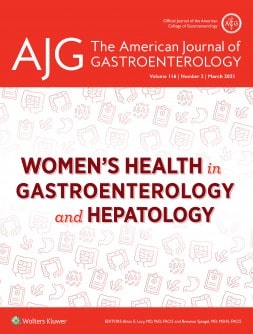The March issue of The American Journal of Gastroenterology, a special issue focused on women’s health in gastroenterology and hepatology, is now available. The issue features new clinical research involving sex and gender, including effects of GI and liver conditions on pregnancy, gender disparities in diet and nutrition, Barrett’s esophagus incidence in women with scleroderma, factors influencing whether women pursue advanced endoscopy careers, endoscopy-related musculoskeletal injuries, sex hormone association with increased prevalence of certain types of cancer, and more.
Of particular relevance are the three articles highlighted below. Access to any articles from this issue, or past issues, is available upon request. The College is also able to connect members of the press with study authors or outside experts who can comment on the articles.
Using NHANES data (2007-2016), this study aimed to evaluate the effects of gender on food insecurity and dietary intake in the United States. The authors found that fewer food insecure women consume the recommended dietary allowance of most macronutrients and micronutrients compared with food insecure men. Despite this, they were also significantly more likely to be obese, have a wider waist circumference, and have higher total body fat percentage.
An association between scleroderma/systemic sclerosis (SSc) and Barrett’s esophagus (BE) is known, and this study’s authors analyzed the largest sample size to date to determine the prevalence of BE in women with SSc, which was determined to be 12.8%. Manometric abnormalities distinguished patients with and without BE in this population and the prevalence of any dysplasia, including esophageal adenocarcinoma, was estimated to be 43% and a calculated incidence of 5.3% per year (0.9% per year for adenocarcinoma). The findings suggest that women with SSc should be included in the screening recommendations for BE and treated accordingly if dysplasia is found.
Women are underrepresented in advanced endoscopy (AE) careers, even though previous studies indicate that female patients have a stronger preference for a female gastroenterologist. Using survey data from GI fellows and attendings, the authors examined underlying gender-specific factors that deter women from pursuing AE. Motivating factors included encouragement from a mentor of any gender to pursue careers in AE, interest in the field, and preference for a procedure-focused career. Deterring factors include additional training time, lack of gender-adjusted ergonomic equipment, work-life balance and family planning, the reimbursement gender gap, and concerns about occupational radiation exposure on pregnancy, fertility, and general health.
About the American College of Gastroenterology
Founded in 1932, the American College of Gastroenterology (ACG) is an organization with an international membership of over 16,000 individuals from 86 countries. The College’s vision is to be the preeminent professional organization that champions the prevention, diagnosis, and treatment of digestive disorders, serving as a beacon to guide the delivery of the highest quality, compassionate, and evidence-based patient care. The mission of the College is to enhance the ability of our members to provide world class care to patients with digestive disorders and advance the profession through excellence and innovation based upon the pillars of Patient Care, Education, Scientific Investigation, Advocacy and Practice Management. www.gi.org







